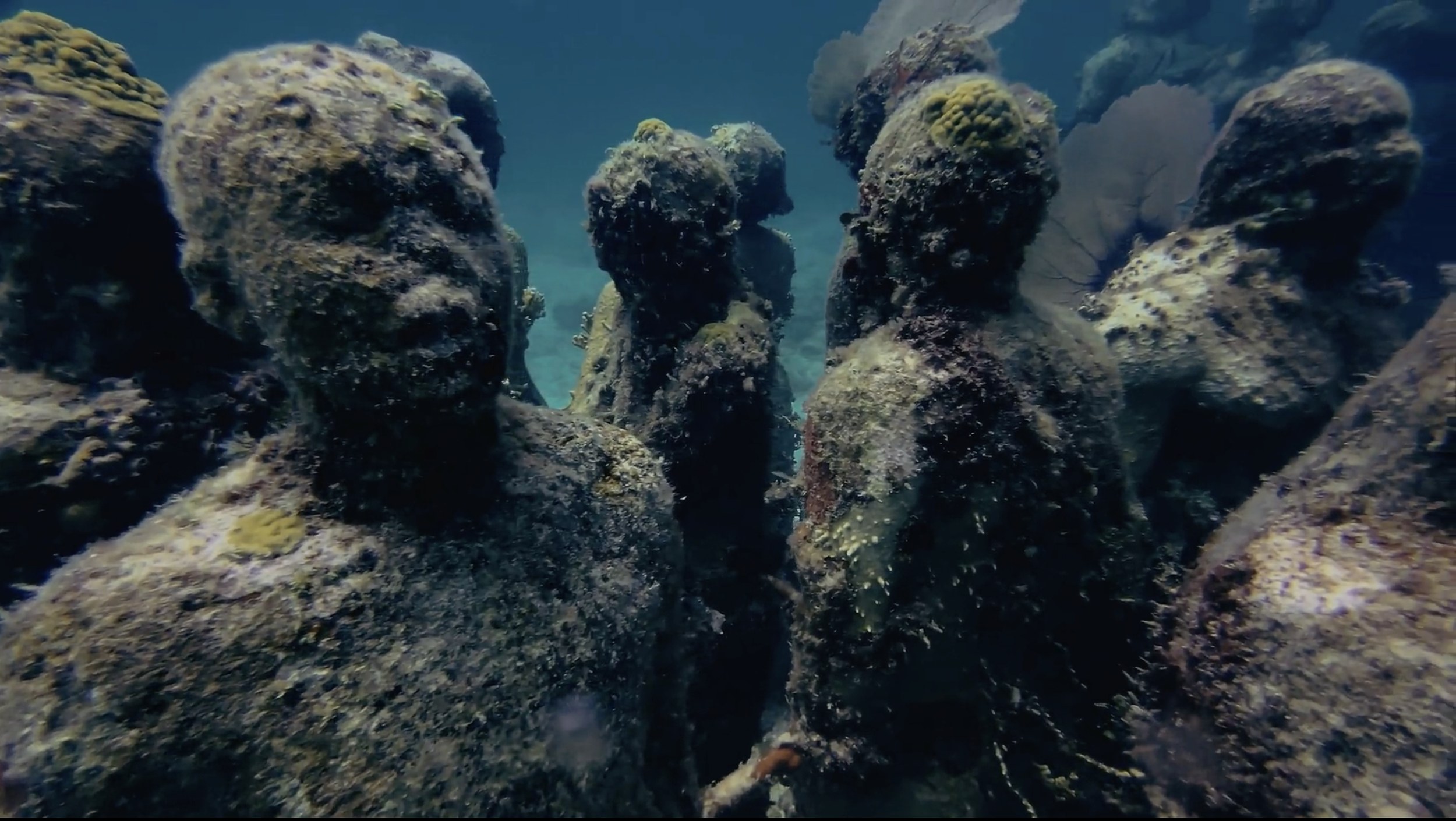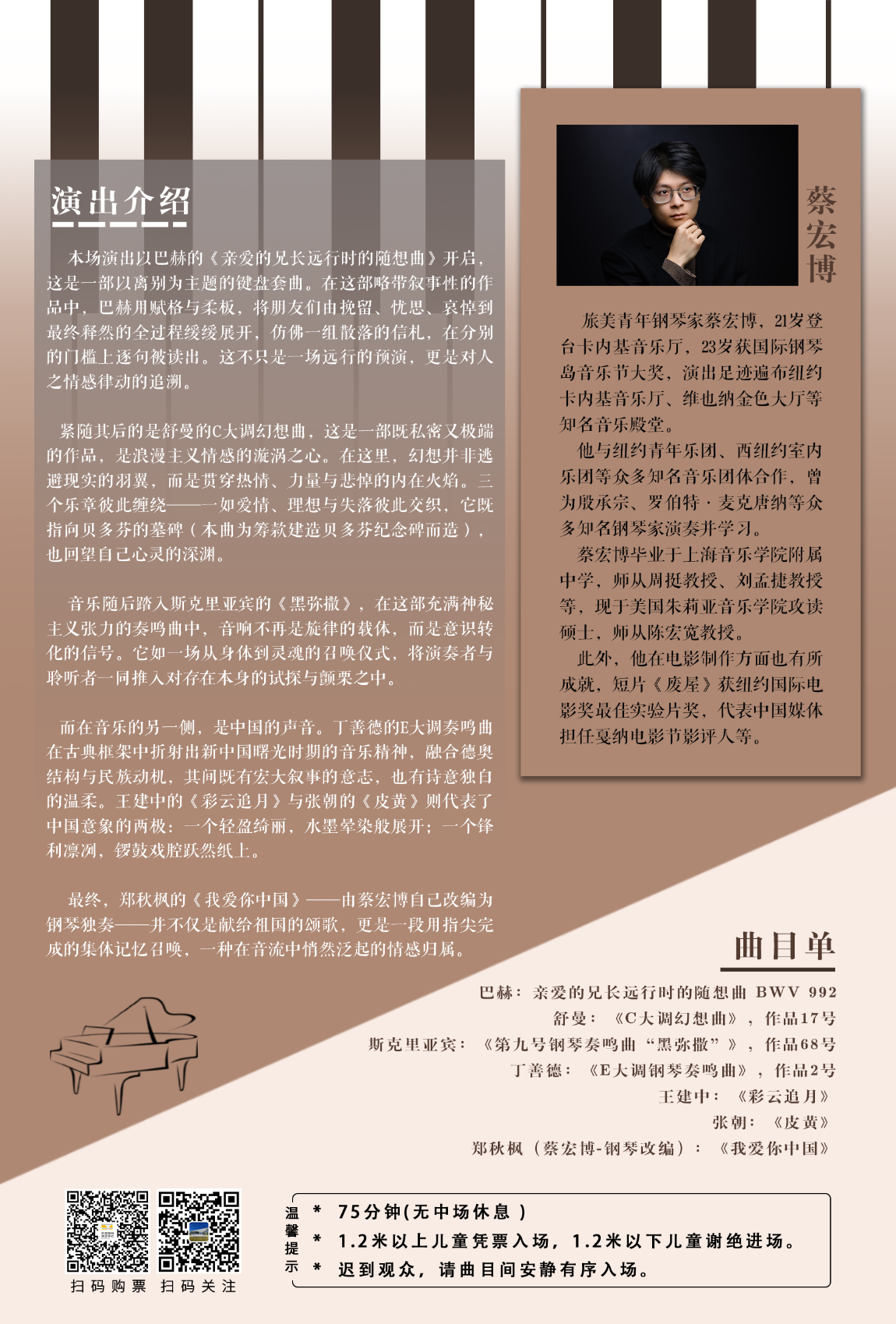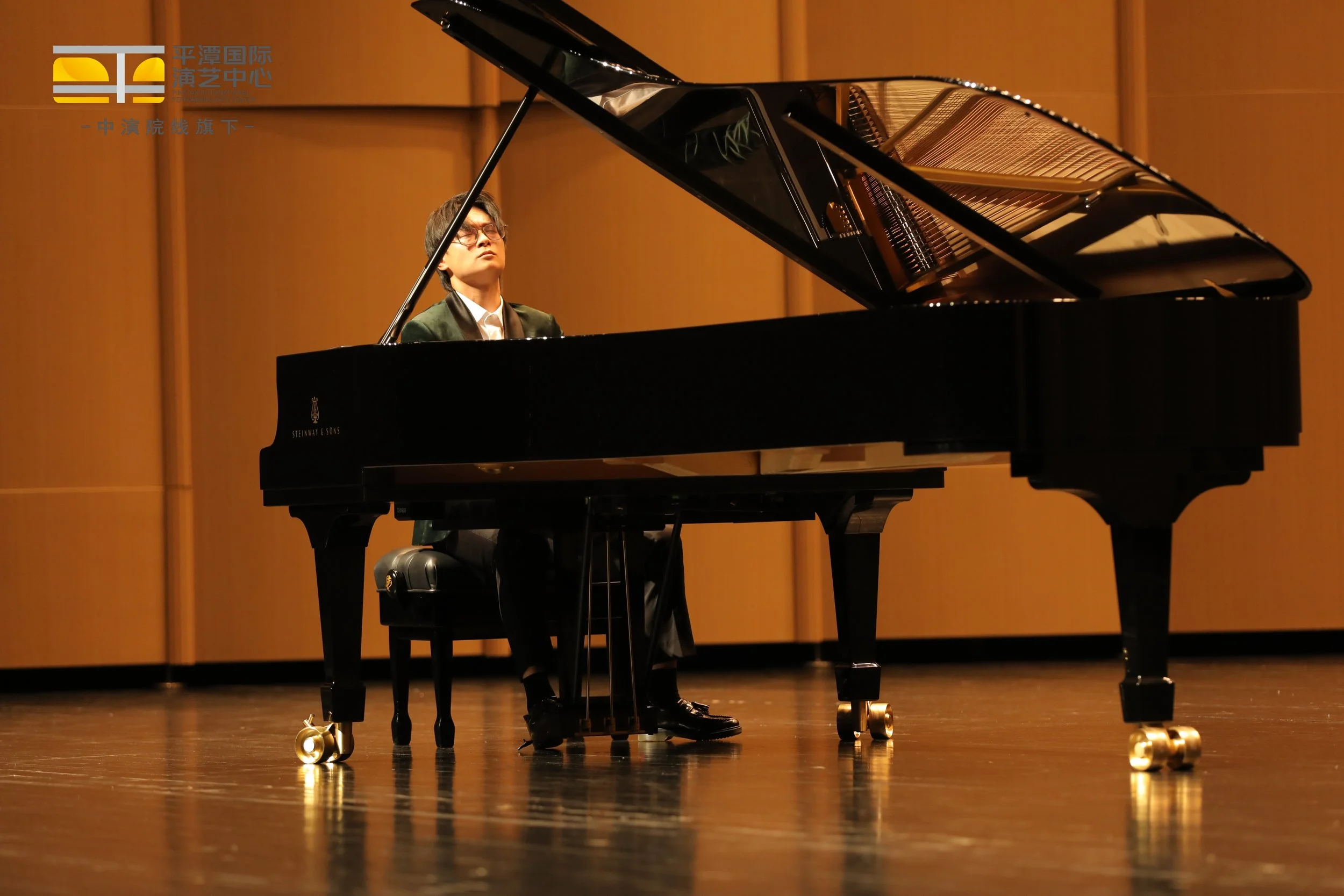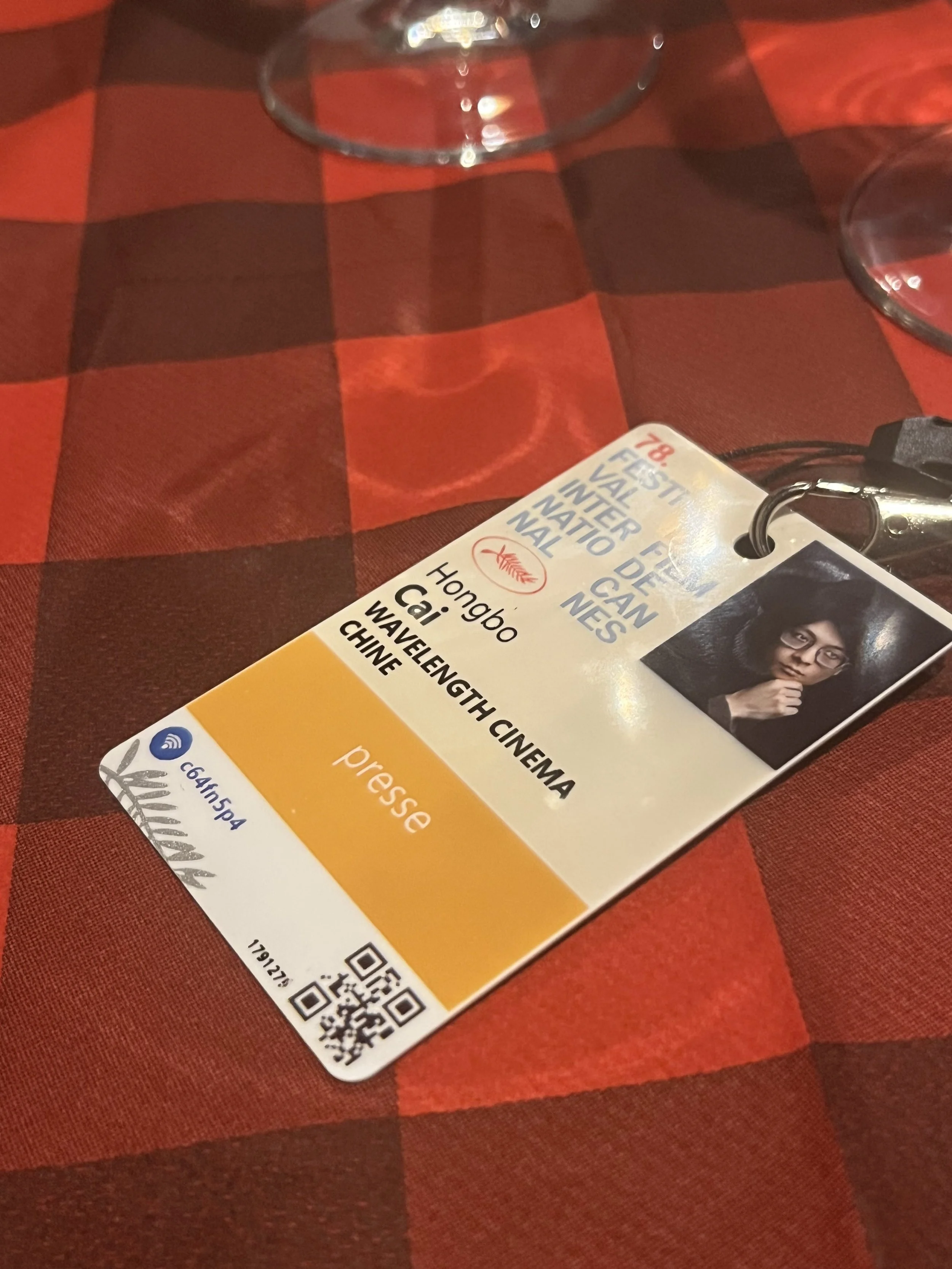
Calendar

The Expansive Canvas - Large-Scale Form in the Music of 19th-Century Women Composers International Conference and Collaborative Symposium
Presentation of Scholarly Paper:
A Study on Feminine Virtuosity as Displayed in Maria Szymanowska’s Twenty Études and Preludes by Hongbo Cai
Location: Vernon Studio, Royal Irish Academy of Music
Time: Aug. 27th 3 pm - 4:30 pm
Part of Session 4b Chamber Music and Virtuosic Writing
View the program here
Co-hosted by The Department of Music at Trinity College Dublin, the Royal Irish Academy of Music, and the Trinity Long Room Hub
Recital: “Timeless Echoes, Myriad Voices” at Pintaan International Performing Arts Center
This event receives generous support from China Arts and Entertainment Group Ltd., CPAA Theatres, Pingtan Cultures & Tourism, Pingtan Blues., and is organized by Silk Road International League of Theatres.
Find Here for Ticketing Info.
The 78th Cannes Film Festival as Chinese Press
Short Review for Selected Films:
<SIRAT> by Oliver Laxe: Rolling dice with God. Since Apocalypse Now, this is the first time someone has truly ventured deep into the wasteland again—battered, blistered, and only upon closing their eyes do they find a way out, only to return with nothing, mysteriously and inexplicably. It defies categorization, and bears no trace of the familiar routes taken by auteur filmmakers’ usual approaches. Laxe’s brilliance lies in the swift, almost weightless transition from the real to the transcendent—like the flick of a light switch. Perhaps in the future, some of its gestures could be carried out with more confidence and conviction. The desert here is both a metaphor for annihilation and for rebirth. A towering work—the best in competition in the past three years.
<EDDINGTON> by Ari Aster: The meaningless allusions to BLM and mask freedom amount to little more than a hollow reenactment of political strife, devoid of direction or precision. If America’s most potent posture during the 2020 election was indeed that of “Parasite” and “Joker”—a cynical, nihilistic outburst against chaos—then in the Trump 2.0 era, every term used to critique the left, the mob, and BIPOC must be scrapped and redefined from scratch. Still delighting in the spectacle of staged storms, Eddington all becomes proof of Ari Aster’s complacent existence within an echo chamber, untouched by real consequence of reality. Cults, the wife’s sexual trauma, the hollowness of campaign slogans, the fabrication of public discourse—not a single thread is followed through.
<LA NOUVELLE VAGUE> by Richard Linklater: Still, it was quite an enjoyable viewing experience. Rather than being made for cinephiles or as an act of homage, it feels more like an introductory course to auteur cinema for teenagers who dream of picking up a camera one day—just as I, freshly out of high school, was mesmerized when I first watched Boyhood.
And yet, in doing so, it fundamentally deviates from Godard himself and his ideals. Even as the film is saturated with his famous punchlines, it treats Godard merely as a symbol of cinematic revolution rather than engaging in any real dialogue with his ideas. But then again, you have to admit: the very nature of revolution is to be misunderstood, to make the “untransmittable” transmissible. In that sense, Linklater has already fulfilled his mission.
<HIGHEST 2 LOWEST> by Spike Lee: Genre storytelling merely provides momentum, while the true protagonist of the film is the potent bloodstream and genetic spirit of Black culture.
It’s not only an accidental inversion and confrontation between high and low social positions, but also a living encyclopedia of a people’s movement from the margins toward the center.
Neighborhoods, subways, slang, basketball, baseball, women, brothers, and sons—we see with absolute clarity how New York is stitched together and sustained by such tides of ambition, triumph, and loss.
When the police, bound by procedure, make no headway, a swift street-side message sets in motion a far more effective pursuit—one carried out not by the system but by the individual.
Street and system, highest and lowest, hell and heaven—never have their connections felt more living.
And this is the brilliance, the undeniable allure, of the African American experience: a continual ascent from below to reach the top, but the top constantly nourished by that very same “below,” always ready to return.
Just as Washington can slip off a suit and throw on a hoodie, it is a beautiful system of dialectics.
<HISTORY OF SOUND> by Oliver Hermanus: A film this outdated, moldy, and putrid in 2025 is simply astonishing. After just one scene together, the characters would start having sex, and within two more scenes, we're fast-forwarded to their breakup. The so-called chemistry between Mescal and O’Connor has nothing to do with love or attraction—held together solely by professional commitment and almost a sense of martyrdom.
The film’s supposed centerpiece—its sound collecting and musical choices—is barren to the level of preschool music education, and by the end, you can visibly witness the collapse of its conviction. An insult to queerness, to music, and to cinema itself—nothing short of a cultural garbage bin.
<SENTIMENTAL VALUE> by Joachim Trier: Perhaps the most resolutely actor-centered film since Mia Madre, this work reaffirms how theatrical labor—"performing" and "re-enacting"—can confront, expose, and even rescue endangered individuals and near-collapsed family bonds, even when those very crises were themselves triggered by the same labor. In a household submerged in intergenerational trauma, each member ultimately finds salvation through "playing" one another—an act that becomes self-redemptive. For theatre, after all, is an exorcism by way of possession: it fills real absences with fictional reunions, a beautiful yet sorrowful paradox.
This rare ethical vision finds its fullest expression in Fanning’s character, whose honestly admits to failure after giving her all to inhabit a role—she steps back. And the director receives this with grace, without interpreting it as a failure. It’s a dual affirmation—of the performer in real life, and the role in the fiction—that reveals what sentimental value truly means.
<RESURRECTION> by Bi Gan: What a grand and romantic time-traveling reverie it was—one that drifted through both the best and the worst of times, all within the same era. Perhaps most remarkable is that, for once, a mainland Chinese film dared to truly fictionalize. Even more extraordinary: it broke free from the heavy shackles of realist suffering, choosing instead to imagine within the narrative of an era—under the most exalted spotlight, flinging open the floodgates of imagination. The wings that caught the wind beat upwards, defying gravity.
Who says that in the opium dens of the smoky late Qing, at bombed-out wartime train stations, or on the gangster-infested streets of the new millennium, we cannot have stories deeply entwined with history, yet so lightly and romantically personal that they slip into the cracks between grand events? In nighttime alleys boy and girl chase and hide, hurt and love one another—and after one song, dawn breaks. The journey at daybreak also marks the end of entanglements. In long takes, in time-lapsed light, we endure until sunrise. Such cinema, such a dream machine.
Recital: "when i was moving ahead occasionally i saw a brief glimpse of magic”
Program information:
JOHANN SEBASTIAN BACH Capriccio on the departure of a beloved brother, BWV 992
ALEXANDER SCRIABIN The Piano Sonata No. 9, Op. 68 "Black Mass"
BÉLA BARTÓK Piano Concerto No. 2 in G Major, Sz. 95, BB 101
ZIYI TAO & HONGBO CAI Ulrica
Juilliard Station Rush Hour Recital: Journal de Folie
Program information:
Hongbo Cai, Piano
SCHUMANN Fantasie in C Major, Op. 17
BARTÓK Etude, Op. 18, No. 3
BARTÓK Out of Doors, Sz. 81
Tristan MURAIL La Mandragore
Click here for the ticketing link
Risk Lab Residency: Community Sharing at Kaatsbaan Cultural Park
Venue: Kaatsbaan Cultural Park, Tivoli, New York
Juilliard Risk Lab Residency
“The Juilliard Risk Lab Residency was established to provide students the opportunity to incubate work of their own creation while cultivating skills essential for a multifaceted, 21st-century artist. This weeklong residency encourages students to collaborate with peers across artistic disciplines and to embrace risk-taking in a supportive, community-centered environment.
The Risk Lab will offer a unique opportunity for participants to explore and create interdisciplinary work alongside their peers from various disciplines. Participants will structure their own rehearsal processes and engage in regular process showings to refine their innovative projects. This residency will culminate in a public showing where participants will present their work to their peers and the Tivoli community.
Throughout the week, participants will benefit from creative guidance, career insights, and collaborative workshops led by Arnhold Creative Associates and Juilliard faculty members. Transportation, lodging, and meals will be provided, allowing participants the opportunity to focus fully on their projects.
Juilliard’s creative enterprise programming, including the Creative Associates program, is generously supported by Jody and John Arnhold and the Arnhold Foundation.”
——from Juilliard’s Official Site
Recital: Steinway Concert Hall (Foshan)
Beethoven: Piano Sonata in G Major, Op. 31, No. 1
Schumann: Fantasie in C Major, Op. 17
Bartók: Suite Out of Doors
With Drums and Pipes
Barcarolla
Musettes
The Night’s Music
The Chase
Scriabin: Piano Sonata No. 9 "Black Mass"
Zhang Zhao: Pi Huang
Jury: Oxford International Piano Open Competition 2025 · Foshan Regional Division
Time: Dec. 22nd
Location: Steinway Piano Music Hall, 3rd Floor, Jinshan Street, Oriental Plaza, Chancheng District, Foshan City
Masterclass and Recital: Steinway Concert Hall (Zhongshan)
Beethoven: Piano Sonata in G Major, Op. 31, No. 1
Schumann: Fantasie in C Major, Op. 17
Bartók: Suite Out of Doors
With Drums and Pipes
Barcarolla
Musettes
The Night’s Music
The Chase
Scriabin: Piano Sonata No. 9 "Black Mass"
Zhang Zhao: Pi Huang
London College of Music Faculty Lecture Series: Efficient Exam Preparation and Repertoire Analysis (Grades 7–8)
Location: Steinway Music Hall (Foshan)
Piano Evening with David Dubal
Program:
Robert Schumann - Fantasie in C major, Op.17
Durchaus fantastisch und leidenschaftlich vorzutragen; Im Legenden-Ton
Mäßig. Durchaus energisch
Langsam getragen. Durchweg leise zu halten.
The Grace & St. Paul’s Church, 123 W 71st St NY, NY 10023
Ticketing Link: https://pianoevenings.com/events/
The New Series | A Musical Lineage: Schoenberg and Boulez (Co-Presented by the New York Philharmonic and Juilliard)
SCHOENBERG Suite, Op. 29
David Robertson, Conductor (Artistic Director of the Sydney Symphony Orchestra)
Hongbo Cai, Piano
Frank Huang, Violin (Concertmaster of New York Philharmonic)
Leslie Ashworth, viola,
Boubacar Diallo, cello
Anthony McGill, clarinet (Principal Clarinet of New York Philharmonic)
Anoush Pogossian, clarinet
Anju Aoto, bass clarinet
Ticketing Link: https://www.juilliard.edu/event/170406/new-series-musical-lineage-schoenberg-and-boulez
curated by Dean David S. Ludwig
at Peter Jay Sharp Theater
I. Ouverture. Allegretto
II. Tanzschritte. Moderato
III. Thema mit Variationen
IV. Gigue
Solo Recital at Piano Island Festival
1st Prize and Grand Prix Winner of the 5th Piano Island Competition
Location: Universitas Pelita Harapan Main Hall, Jakarta, Indonesia
Program:
Beethoven: Piano Sonata in G major, Op.31 No.1
Robert Schumann: Fantasie in C major, Op.17
Aleksandr Scriabin: Piano Sonata No.9, Op.68
Concerto with Orchestra Il Contrappunto
Location: Teatro La Compagnia, Florence, Italy
Program:
Sergei Prokofiev - Piano Concerto No.2 in G minor
Recital at Foshan Grand Theater
in collaboration with China Art and Entertain Group and CPAA theaters
Programs
Sergei Prokofiev: Piano Concerto No.2
Orchestra Reduction: Yihao Li
Robert Schumann: Fantasie in C major, Op.17
Bela Bartok: Out of Doors, Sz. 81
Ticket link: https://mp.weixin.qq.com/s/rSiO_-z-hRSzA0x2qE1jIg
Chamber Concert of Schubert "Trout" Quintet on Fortepiano
Violin: Yun-Chung Lin
Viola: Pin-Hao Liao
Cello: Eugene Kim
Bass: Lon-Fon Law
Fortepiano: Hongbo Cai
Program: F. Schubert - Piano Quintet in A major, D. 667 “Trour”
Allegro vivace (A major)
Andante (F major)
Scherzo: Presto (A major)
Andantino – Allegretto (D major)
Allegro giusto (A major)
Concert in Adelphi Orchestra Final
Second pianist: Charlie Chen
Tchaikovsky: Piano Concerto No. 1, Op. 23
Concerto with Western New York Chamber Orchestra
Location: King Concert Hall at State University of New York Fredonia
Repertoire:
Dmitri Shostakovich - Piano Concerto No.1 in C minor
Conductor: Glen Cortese
Event Video: https://www.youtube.com/watch?v=yFFaGM3s2eI
Solo Recital: Banlam Grand Theater, Xiamen, China
Program:
Ludwig van Beethoven - Sonata No.16 in G Major, Op.31 No.1 “Humour”
I. Allegro vivace
II. Adagio grazioso
III. Rondo, allegretto – Presto
Bela Bartok - "Out of Doors" Suite, Sz. 81 (Book. I)
With drums and pipes
Barcarolla
Musettes
Night Music
The Chase
Henri Dutilleux - Piano Sonata, Op.1
III. Chorale et variations
——————intermission——————
Robert Schumann - Sonata No.1 in F sharp minor, Op.11
Un poco adagio - Allegro vivace
2. Aria: Senza passione, ma espressivo (A major)
3. Scherzo: Allegrissimo – Intermezzo: Lento. Alla burla, ma pomposo – Tempo I
4. Finale: Allegro un poco maestoso
Claude Debussy - Petite Suite, L.65
En bateau (Sailing): Andantino
Cortège (Retinue): Moderato
Menuet: Moderato
Ballet: Allegro giusto
with Guest Pianist: Yuxi Luo
Concerto with Shanghai Opera House
Concert Program:
Dmitri Shostakovich: Piano Concerto No.1 in C minor, Op. 35
Solo Trumpet: Huanyi Yang
Allegro moderato
Lento
Moderato
Allegro con brio

Solo Recital - Bibliothèque Nationale du Royaume du Maroc, Rabat
Program:
Jianzhong Wang - Colourful Clouds Chasing The Moon
Zhao Zhang - Pi Huang (Fantasy on Pekin Opera)
Ludwig van Beethoven - Sonata No.16 in G Major, Op.31 No.1 “Humour”
I. Allegro vivace
II. Adagio grazioso
III. Rondo, allegretto – Presto
Franz Liszt - Années de pèlerinage: 2ème année:
Après une lecture du Dante (Fantasia quasi Sonata)
Robert Schumann - Sonata No.1 in F sharp minor, Op.11
Un poco adagio - Allegro vivace
Bela Bartok - "Out of Doors" Suite, Sz. 81 (Book. I)
With drums and pipes
Barcarolla
Musettes
Henri Dutilleux - Piano Sonata, Op.1
III. Chorale et variations
Zhanhao He - The Butterfly Lovers
Chengzong Yin - Ode to the Yellow River
Juilliard Chamber Music Concert - Morse Hall, New York
Program:
W. A. Mozart - Sonata for violin & piano No. 20 in C major, K. 303 (K. 293c)
1. Adagio - Molto Allegro - Adagio - Molto Allegro
2. Tempo di Menuetto
W. A. Mozart - Sonata for Piano and Violin No. 21 in E minor, K. 304
Allegro
Tempo di Menuetto
Franz Schubert - Violin Sonata No.1 in D major, Op. 137 (D384)
Allegro Molto
Andante
Allegro Vivace
Antonio Vivaldi - Trio Sonata No. 5 in F major for two violins and basso continuo, Op. 1, RV 69





























